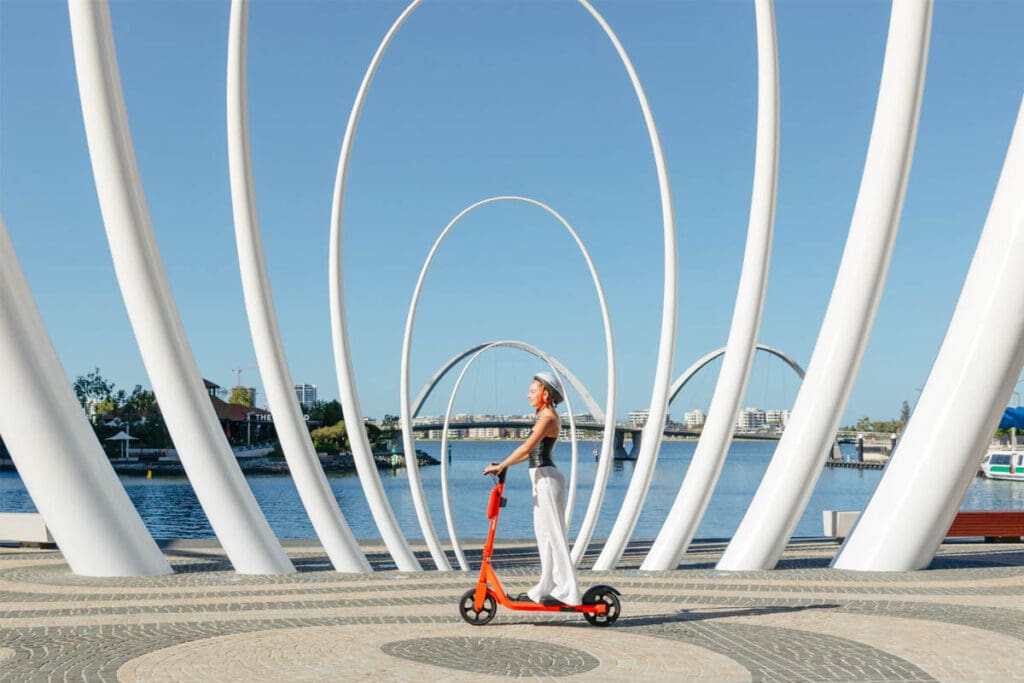First E-Scooter Share Service for Perth CBD

Perth, WA
Downtown Perth is about to get its first taste of e-scooter share services, with Neuron Mobility and Bird rolling out scooters in the heart of the WA capital from tomorrow.
The trial has been scheduled for two years and will add to existing WA locations for both operators.
Neuron already has operations in two other WA local government areas. The Singapore-based company began trials at Busselton, in the WA south west, last December and in the City of Stirling, in Perth’s northern suburbs, in February 2022.
Neuron now has e-scooters services in every major city in Australia, as well as many regional centres.
The Perth trial will be Bird’s first e-scooter share service in an Australian major city, following its introduction of services in three regional WA centres further south, Bunbury, Albany and Margaret River.
Both companies will be rolling out 250 scooters each for the City of Perth trial, which will enable users to travel across the Perth CBD and surrounding suburbs including East Perth, Crawley and Northbridge.
New Markets for Beam
Beam expanded its share services into three new markets this month.
It launched its first e-bike services in Victoria, deploying 250 e-bikes in the City of Hobsons Bay and the City of Melton.
In addition, the company is partnering with 15 businesses in the NZ adventure tourism hub Queenstown to roll out 300 of its purple e-scooters in that city.
Bolt Reckless Ride Score
A ‘reckless rider’ score to identify unsafe share scooter users, and spark rider education measures, has been launched by Europe’s largest micromobility share service operator, Bolt.
The company says the rating, introduced as part of Bolt’s new Scooter Safety Pledge, is the industry’s first comprehensive system to evaluate riders’ behaviour with the aim of tackling unsafe scooter riding habits.
The rider scoring system evaluates a rider’s behaviour based on a wide set of inputs collected from Bolt’s scooter features and sensors.
“The list of indicators includes tandem riding detection, frequent abrupt braking and skidding, collisions, and illegal parking. Each of those behaviours is marked in the system with points and the user’s riding behaviour is evaluated after every five rides,” Bolt says in a statement.
“If a rider falls into a group of two percent of the most reckless customers in a given city, Bolt will impose measures as a part of a three-step policy.
“As a first measure, Bolt will share additional educational materials with reckless riders, since the company believes that reckless riding can be tackled initially by raising awareness on the hazards that riders expose themselves to.
“If the riders do not improve their behaviour over the next five rides, their scooter speed will be limited to 15 kmh for the next five rides.
“If the two measures do not bring any improvement, users will be suspended for one week, with the option to appeal the decision to Bolt’s customer service.”
The feature is being tested in Germany and Portugal and will be scaled to other markets in the coming months.
Bolt’s scooter safety pledge showcases nine points which it says are essential in building safe micromobility, based on input from city policy makers and Bolt’s own operational experience in 260 cities across Europe.
The pledge also includes working with cities to create safe conditions for micromobility, curbing scooter riding with intoxicated, effective rider education and addressing scooter parking in public areas.
Commuting Strain Intensifies
A survey of commuting in Australia has found 48% of Australians say higher costs of commuting have resulted in considerable financial pressure on their household.
The Real Australian Commute Report, conducted by Real Insurance, surveyed 5,000 commuters across Australia and found 71% of respondents believe the rising cost of living has reasonably impacted their commuting costs in the past year.
It calculated the daily commute is costing an average of $20 per day, and a massive $4,003 per year.
Neuron Mobility said this contrasted sharply with the cost of micromobility share services and cited its Monthly Pass, which could cost users as little as $3.30 per day.
“Making the switch to a rental e-scooter could save cost-conscious commuters over $501 per month or an astounding $2,799 per year,” Neuron says in a statement.
